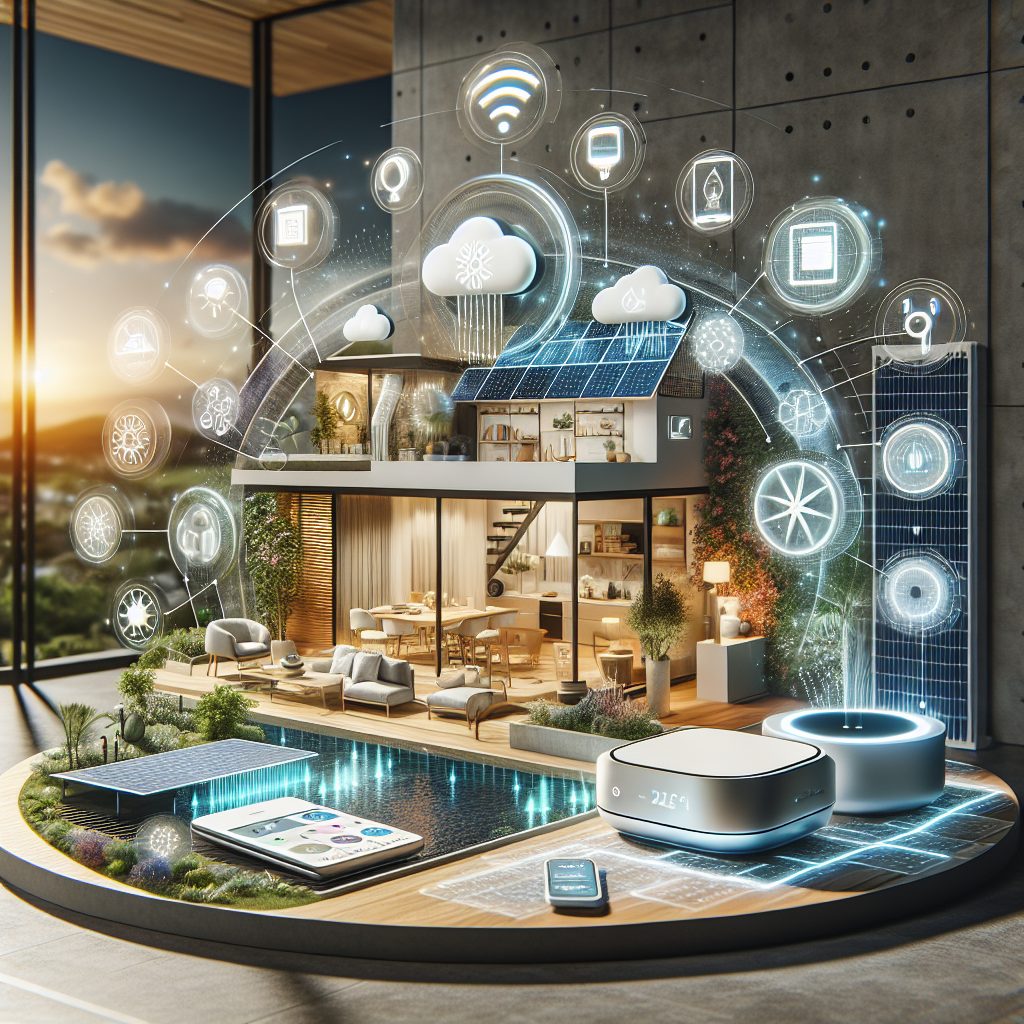
The future of HVAC technology is an area of great excitement and advancing possibilities. According to the most recent information from the Department of Energy, heating, ventilation and air conditioning systems are becoming more efficient, reliable and affordable. As technological advancements continue, this field of home comfort is expected to provide more flexibility and create an enhanced environment both inside and outside the home. With the implementation of smart home technology as well, HVAC systems are now able to be connected directly to other devices such as home security systems, smoke detectors and energy management systems.
In the future, home owners should expect HVAC systems to become even more efficient, helping to reduce their monthly bills while still keeping their interiors comfortable. Technology is also continuing to improve the safety of home HVAC systems with an emphasis on much better diagnostics and preventative maintenance features. One major advancement is the use of sensors, which can monitor and adjust the temperature settings of the system to maximize comfort and energy efficiency, providing more control over a home’s climate. By managing the temperature of the home, sensors can help reduce energy consumption and increase energy savings. Additionally, newer systems can also assist in reducing indoor air pollutants, helping to create a healthy living environment.
Key Takeaways
1. HVAC technology will continue to be an integral part of efficient and comfortable buildings.
2. Smart technologies can be used to improve heating and cooling systems, optimizing the use of energy whilst increasing occupants’ comfort.
3. Innovative technologies such as smart thermostats, sensor-assisted airflow, and artificial intelligence will enable the HVAC system to be more intelligent and energy-efficient than ever before.
4. HVAC systems can now be integrated with lighting and other building systems, allowing for easier and more efficient operation.
5. Developments in HVAC technology will help reduce the carbon footprint of buildings and make them more sustainable in the future.
What Can We Expect From the Future of HVAC Technology?
Smart Thermostats
One of the most promising technologies making its way to HVAC systems is the smart thermostat. Smart thermostats use sensors and data from IoT devices to learn the user’s temperature and environmental preferences, like time of day, humidity levels, and day of the week. Smart thermostats also give users the ability to control their temperature and settings remotely through a mobile app. This makes it convenient and energy-efficient to set temperature schedules and make sure that the HVAC system is running only when it needs to be.
Energy Efficiency
HVAC systems are becoming increasingly energy-efficient. As companies look for ways to reduce energy costs and increase sustainability, they have developed technologies aimed at making HVAC systems more efficient. These technologies typically involve the use of variable speed blowers, multi-speed compressors, and improved insulation. These innovations help reduce the amount of energy used by the HVAC system, potentially providing significant economic benefits.
Building Automation Systems
Building automation systems are increasingly being used to control HVAC systems. These systems allow users to control a variety of aspects of the HVAC system, such as temperature, humidity, and ventilation. Building automation systems can also detect when a user is in the building and adjust the temperature accordingly. This allows for a more comfortable environment and can save energy.
Ductless HVAC Systems
Ductless HVAC systems are becoming increasingly popular as a way to heat and cool residential and commercial buildings. This is because these systems are more energy efficient and can be used to heat and cool specific areas of the building. This is especially helpful for buildings that have rooms or areas with different temperature needs.
Geothermal HVAC Systems
Geothermal HVAC systems are becoming increasingly popular as a way to heat and cool residential and commercial buildings. This is because these systems are powered by capturing thermal energy from the ground. This energy is then used to heat and cool the building. Geothermal HVAC systems are also more efficient and cost-effective than other traditional HVAC systems.
Collaborative Robots
Collaborative robots, or “cobots,” are becoming increasingly commonplace in HVAC maintenance. These robots are able to assist technicians in their work, allowing them to be more efficient and accurate. The robots are also able predict potential problems and give maintenance teams on the spot guidance in diagnosing and fixing those problems, resulting in increased system reliability.
Robotic Dusting
Robotic dusting is an up-and-coming technology that is exciting to many in the HVAC industry. Robotic dusting robots use sensors to determine when dust has built up on HVAC components, such as grilles and registers. When the sensors detect dust, the robots move in and use a built-in nozzle to blow the dust away. This helps to maximize system efficiency by removing dust from HVAC components and reduces the need for manual cleaning.
What Are the Best Practices for Implementing the Future of HVAC Technology?
1. Consider your current HVAC system and the improvements that could be made.
2. Investigate what type of technologies are available and determine which are best suited to your needs.
3. Plan a timeline for implementation and determine how to budget for the technology.
4. Think about any training that may be needed to ensure the technology is used correctly and effectively.
5. Determine what support will be available if there are any issues with the technology.
6. Regularly review your system to ensure that it is running smoothly.
What is HVAC Technology?
HVAC technology stands for “Heating, Ventilation, and Air Conditioning” and refers to the technology and systems used to control the temperature, ventilation, and air quality of interior spaces. HVAC systems include equipment such as air handlers, furnaces, air conditioners, system controllers, and more.
What benefits does modern HVAC Technology offer?
Modern HVAC technology offers a number of benefits, such as improved energy efficiency, greater control over temperature and humidity, more reliable heating and cooling, and increased indoor air quality. Additionally, modern HVAC systems typically feature a range of smart technologies, making them easier to monitor and control.
What are the drawbacks of HVAC Technology?
The main drawback of HVAC technologies is that they can be costly to install and maintain. Additionally, some HVAC technologies may be unsuitable for certain buildings and environments. It is important to consult a professional to determine the best HVAC system for your needs.
What trends are shaping the future of HVAC Technology?
The future of HVAC technology is being shaped by a number of trends, including the increasing demand for smart systems, the use of energy-efficient materials, and the development of advanced sensors and monitoring tools. Additionally, the use of renewable energy sources, such as solar power, is becoming more popular in HVAC systems.
How will HVAC Technology evolve in the future?
HVAC technology is constantly evolving, with new systems, products, and techniques becoming available. In the future, HVAC systems are expected to become smarter and more efficient, with improved automation and energy management capabilities. Additionally, the use of renewable energy sources is expected to become more widespread.
What are the main challenges faced by HVAC Technology?
One of the main challenges faced by the HVAC industry is the rapid development of new technologies and techniques. With changing trends and consumer demands, HVAC companies must be able to keep up with the ever-changing industry. Additionally, human resources and training can be a challenge, as many HVAC technicians may lack in the necessary skills and knowledge needed to install and maintain modern HVAC systems.
Will HVAC technology become more affordable in the future?
The cost of HVAC technology is likely to increase in the near future, as the demand for energy-efficient and smart systems rises. However, there are several initiatives in place to make HVAC technology more accessible and affordable, such as energy efficiency programs and government incentives.
How does HVAC Technology help the environment?
HVAC systems can help to reduce emissions by improving energy efficiency. Modern HVAC systems use a variety of technologies to reduce energy consumption and improve efficiency, which can help to reduce greenhouse gas emissions. Additionally, HVAC systems can help to improve indoor air quality, which has direct and far-reaching benefits for the environment.
What is the future of HVAC Technology?
HVAC technology is constantly evolving and becoming more efficient and user-friendly. In the future, HVAC systems are expected to become smarter and more automated. Additionally, more renewable energy sources are expected to be used in HVAC systems, helping to reduce carbon emissions and improve energy efficiency.
How can I get the most out of my HVAC system?
The best way to get the most out of your HVAC system is to ensure that it is properly maintained and serviced on a regular basis. Additionally, it is important to keep up to date with any new HVAC developments, as the industry is constantly evolving, and you may need to upgrade your system in order to keep up with the latest trends and technologies.
Final Thought
The future of HVAC technology is promising. New systems, materials, and techniques are emerging all the time, providing exciting possibilities for energy efficiency, improved control, and enhanced indoor air quality. HVAC companies must ensure they are up to date with all the latest developments in order to continue to provide their customers with the most advanced and efficient systems on the market.
The use of renewable energy sources and advanced monitoring tools are making HVAC technology more affordable and accessible than ever before, allowing consumers to reap the many benefits of modern HVAC systems. As HVAC technology continues to evolve, it is essential that the industry keeps up with the changing trends, in order to provide consumers with the best possible products and services.



